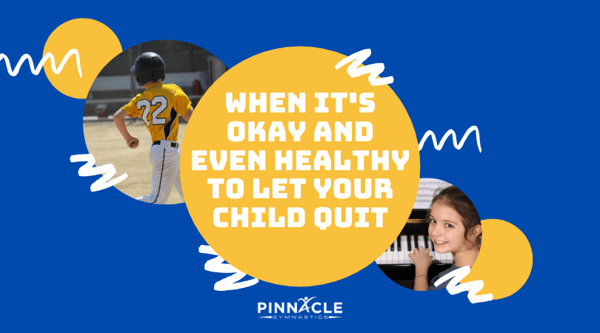As parents, we all know the advantages of having your child participate in an activity or sport. As long as children are not overbooked, extracurricular activities instill great values like teamwork, responsibility, and a sense of community. These activities can build up a child's confidence and help him improve his social skills, exposing him to new interests and passions. Additionally, they are linked to healthier choices like avoiding drug use and maintaining a healthy body weight.

After school programs are helping fill the gap caused by shrinking school budgets. Extra-curricular activities help to provide the type of educational content- especially in arts, music and foreign language, which help students have a brighter mindset and excel better in the classroom.
What happens though, when you and your child have committed to a season of soccer or summer piano lessons and your child says she wants to quit? What happens when it becomes a struggle and your child begs, or worse yet cries to stay home? Do you force her to continue? How do you know when it's okay to let your child quit?
A few years ago Michelle Obama was quoted in an article saying that in raising her young daughters, they had to take up two sports: one they chose and one selected by their mother. "I want them to understand what it feels like to do something you don't like and to improve," the first lady has said. In speaking of her daughters playing the sport of tennis she has said, "It's a great way to stay healthy, to stay fit, it's a lifelong sport, it's something I've tried to tell my kids- I forced them into playing tennis...it's a great way to stay active," Mrs. Obama said.
As it turns out, many experts agree that it's fine to insist on certain activities, depending on your child's age and temperament, the activity itself, and your own motivation in wanting her to do it. "I believe in giving kids as much choice as possible. But they also need structure, a work ethic, and to focus their energy someplace positive," says Jenn Berman, Psy.D., author of The A to Z Guide to Raising Happy, Confident Kids.
.jpg?width=600&name=When%20Its%20Okay%20and%20Even%20Healthy%20to%20Let%20Your%20Child%20Quit%202%20(3).jpg)
Is your child a little nervous or is this anxiety?
Some kids are nervous about coming out of their shell, or are perhaps experiencing self-doubt. "Some kids resist new activities or challenges because they don't naturally enjoy going out of their comfort zone, as opposed to kids who like to rise to a challenge, " says pediatrician and author Ari Brown, M.D. "If your child isn't much of a risk-taker, at so some point you have to push a little bit to help him." Of course if your child won't even get near a diving board, you shouldn't force a child to jump off, or worse, push him in. If he has a legitimate fear of water, you need to be patient.
Get to the bottom of your child's resistance. Have an open discussion with your child about his fears so you can talk through it and help alleviate what he's afraid of. Many times kids have anxiety because they aren't sure what to expect and giving them a dose of reality can really help.
Don't bribe, but try to make the activity fun
When my son went through a mid-season, "I want to quit" attitude during his flag-football season, I told him we'd indulge in a post-game slushy or submarine sandwich on occasion. It gave him something to look forward to and it was time well spent after his games to talk about the positives he experienced, and how he felt proud of his achievements. He really enjoyed this time spent together and ultimately pushed him out of his slump.
Get creative with regards to practice. Tell your daughter that you'll sit with her as she practices piano, taking in every song and offering encouragement. Or offer to video her while she puts on a piano recital at home, then send to family and friends.
Re-frame quitting
There's a belief that quitting is cowardly, but when you insist that your child sticks with an activity that makes them miserable, are you unintentionally teaching them to stay in a bad situation? If you do let them quit, you're helping your child work up the courage to take control of their own life and future. Many people believe that quitting defines one's character, but that's just not true. In her book, "Enough as She Is," Rachel Simmons writes, "Adolescence is a period marked by difficult transitions, and the choice to change course, drop out, and yes, quit-with the right support and reflection- can be a spectacularly brave act of self-respect."
Help your child come up with another plan
This time of your child's life is the perfect opportunity to explore what they like and don't like. Play on their strengths and interests and don't be shy about trying as many activities as possible.Make a list of activities, pick something, and just go for it. And if they don't pick something, say, I'm picking something for you, and if you don't like it, you'll never have to do it again.

We have a cultural bias about quitting as we tend to view it as "giving up," but quitting can be empowering and can actually free up your child's time to try something new!




